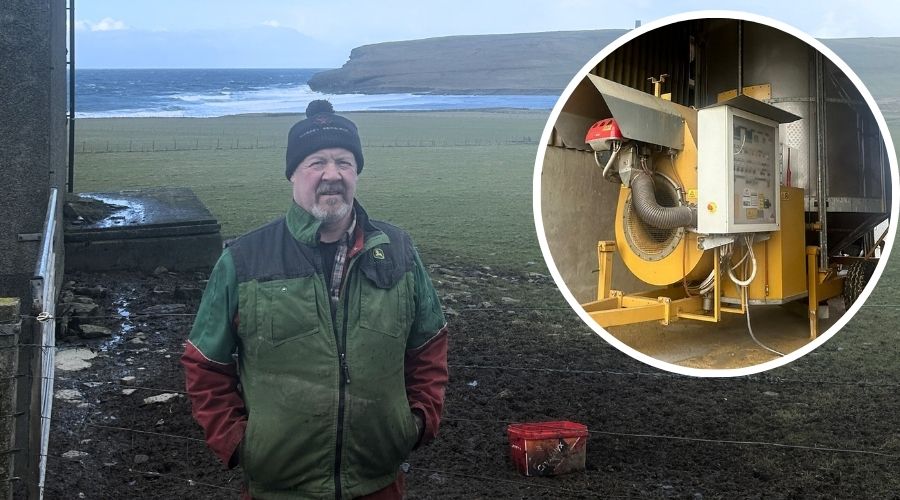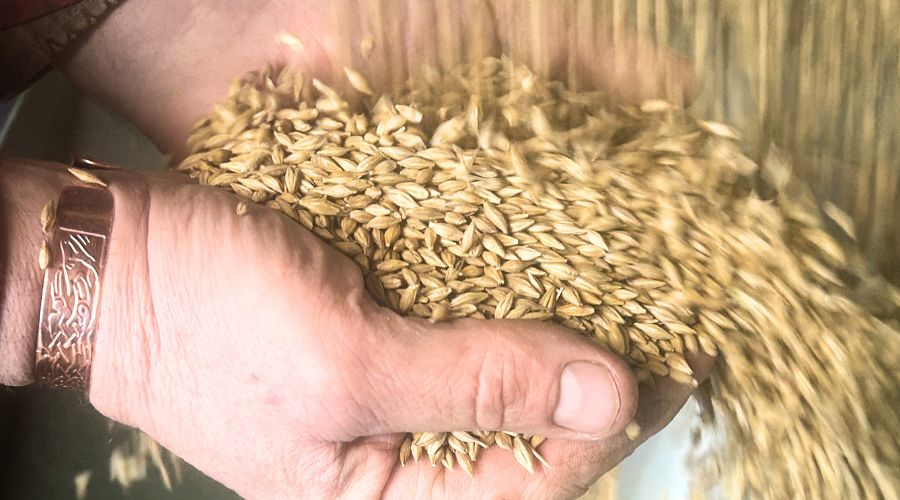Orkney heritage Bere barley grower invests in second McArthur BDC Mecmar drier
18th February 2025
J&S Hay farmers and contractors who farm 230 acres of their own farm and 320 rented acres in Birsay, Orkney, have purchased a second Mecmar mobile drier to increase the drying capacity of their heritage Bere barley, and certified seed barley, freeing up time previously spent monitoring grain drying.

Marty Hay said: “My mother, Sheena, and two brothers, Stevie and Duncan, farm beef, sheep and arable. Our contracting business, J&S Hay, one of the biggest in Orkney, grows 150 acres of Bere barley, 75 acres of certified seed barley, 75 acres of feed barley and a small acreage of oats. We are the most northerly growers of certified seed barley.”
J&S Hay grows Bere for the Birsay Heritage Trust on land Mr Hay sources, under stubble-to-stubble contracts between the trust and individual landowners.
“Not only do we dry our own grain, we also dry barley and oats for local farmers and we needed to increase our drying capacity with a more automated solution.
“We already had a PTO driven Mecmar which we loved but we had to switch the drier on, set the temperature and regularly check the moisture content of the grain.
“Checking the moisture content is key for us. Bere is a very valuable crop and it takes a long time to dry and must not be over dried, so regular monitoring is essential. The same applies to our certified barley seed, which we sell to local farmers,” Mr Hay added.
Once the grain was dried, the Hays had to manually set the PTO driven Mecmar to discharge and then turn the drier and the tractor off. The overall manual operation was very time-consuming.
Mr Hay explained: “We were keen to stick with Mecmar as our existing drier had served us very well. Following discussions with McArthur BDC we decided to purchase a used automatic electric Mecmar D 18 T with built-in aspirator cleaner.
“The Mecmars really do hold their second-hand value, which is a benefit for both buyers and sellers.”
Much-needed extra capacity
The Mecmar D 18 T was taken by lorry to Aberdeen, then put on a ferry to Orkney, where it was collected by Mr Hay. Two McArthur BDC team members travelled over and spent two days installing the drier.
Grain comes off the combine into trailers and is taken back to the farm, where it is tipped into separate bunkers in a grain shed. From the bunker, the grain is picked up by telehandler and put into a hopper that feeds the electric Mecmar’s intake auger.
Using the drier’s control panel the temperature is set, and the grain is automatically dried to the correct moisture content.

During drying the Mecmar D 18 T’s built-in aspirator cleaner automatically removes dust and chaff from the grain.
The manufacturer explained that once dried to the correct moisture content, the Mecmar D 18 T automatically discharges the grain into a bunker in an adjoining dry grain storage area. The seed barley is placed into storage bins and the Bere barley is stored in tote bags. Bere from different farms and different fields are stored in separate and clearly labelled tote bags to prevent potential cross contamination.
Bere is an ancient form of barley, with a unique appearance and taste, and has been grown and milled in Orkney for over 300 years. It is a quick-growing but poor-yielding crop that J&S Hay sows in mid-April and hopes to harvest in the second half of August. From the 150 acres grown, the yield is between 200-250t.
Some of the Bere barley grown by J&S Hay goes to Barony Mill, Orkney’s only water mill, run by the Birsay Heritage Trust, where it is stone ground into Beremeal which is used by most Orkney bakeries.
The majority of the Hay’s Bere barley goes back to the mainland (just north of Aberdeen) to be malted and then returns to a local Orkney distillery to produce whisky.
“We are very happy with the electric Mecmar D 18 T. It has delivered the extra capacity we need. When we are at our busiest, both Mecmar driers are running. By drying different crops in each we are able to save time by not having to clean out one drier between batches.
“The automated Mecmar has also helped us to reduce a significant amount of man hours as we can just leave it to get on with drying the grain with no need for us to regularly monitor the moisture content of the grain. We can get on with other jobs.
“This automation has been very welcome as it has also helped us to reduce late nights during harvest,” Mr Hay concluded.
Read more arable news.
